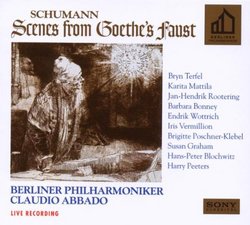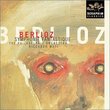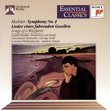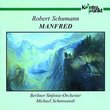| All Artists: Robert Schumann, Claudio Abbado, Berlin Philharmonic Orchestra, Tolzner Knabenchor, Susan Graham, Bryn Terfel, Hans Peter Blochwitz, Barbara Bonney Title: Schumann: Scenes from Goethe's Faust Members Wishing: 0 Total Copies: 0 Label: Sony Classical Release Date: 2/28/1995 Genre: Classical Style: Opera & Classical Vocal Number of Discs: 2 SwapaCD Credits: 2 UPC: 074646630822 |
Search - Robert Schumann, Claudio Abbado, Berlin Philharmonic Orchestra :: Schumann: Scenes from Goethe's Faust
 | Robert Schumann, Claudio Abbado, Berlin Philharmonic Orchestra Schumann: Scenes from Goethe's Faust Genre: Classical
|
Larger Image |
CD DetailsSimilar CDs |
CD ReviewsSchumann's life work in full brightness ymatsui4 | Tanashi, Tokyo Japan | 10/29/2006 (5 out of 5 stars) "Schumann spent more than 10 years to compose this striking work: Early 1840's he wrote the final chorus on last scenes in Goethe's Faust (now Part 3). Following this he composed Part 1, which dealt with Gretchen's pray and crime from Faust's Erster Teil. In 1850, he restarted the composition, then Faust's Zweites Teil on Faust's death (now Part 2): in which Schumann succeeded to set in music Faust's most famous words 'Verweile doch, du bist so schön!' (Pause the time, you are so beautiful). Just before his last illness Schumann completed this by writing an overture (1853). The performance and recording are both of the first rate, sufficient to break the superstition that Schumann's late music is nothing but waste. Simply hear this. There is a vastly encompassing great music. " The modern choice for Schumann's "Faust" Santa Fe Listener | Santa Fe, NM USA | 04/08/2010 (4 out of 5 stars) "Few conductors take up Schumann's oratorio based on Goethe's Faust, and fewer still have recorded it. Between 1972, when Benjamin Britten gave live performances at the Aldeburgh Festival, later released by Decca, and 1994, when Claudio Abbado made this live recording with Bryn Terfel in the title role, I can't recall a single other version. The reason isn't hard to fathom. Extravagantly praised by connoisseurs, the music is at times discursive and wandering. It dates from late in Schumann's career, when his inspiration was steadily fading. Part 3 came first, in time for the Goethe centennial of 1849, with Parts 1 and 2 slowly following, culminating in the Overture, composed in 1856, just before he fully succumbed to mental illness. I find the Overture rambling and melodically neutral. It's probably best to begin with Part 3, not just because it came earliest but because, like Mahler in his Eighth Sym., Schumann was most inspired by the metaphysical second half of Goethe's epic.
This was unusual. The doomed love story between Faust and Gretchen has always been the popular part, in no small part because Mephistopheles steals the show. Schumann devotes Parts 1 and 2 to this half, but he begins after the Faustian bargain has been struck and gives us a disjointed handful of scenes, including the Cathedral Scene and Faust's death. I won't say that any section strikes me as pure genius while others are outright lame. But Schumann the melodist isn't at his best, for those of us who love his songs, and Mahler had a more cosmic conception of the metaphysical scenes when Faust's soul is transmuted into Doctor Marianus and rises upward through the levels of heaven. Abbado's account is centered around Bryn Terfel as the star, and his Faust is as good as you'd expect form a singer who succeeds so well in Schumann's lieder. The supporting cast is equally starry. I wish Karita Mattila's Gretchne were more touching, and Rootering's Mephisto more menacing. They have fallen into line with Abbado's rather too civilized conducting. Orchestra and chorus are beyond reproach, and Sony's live concert recording is as good as a studio job. but criticism is moot, since Britten's classic account is out of print and hard to find at a reasonable price. Pierre Boulez has a more energetic account on Opera d"Oro, but it's a BBC broadcast form 1973 if rather dull mono. So Abbado has the field to himself, unless you want to explore a period account under Philippe Herreweghe, which doesn't boast singers anywhere of tis caliber, or a recent Harnoncourt set with the Royal Concertgebouw; it also struck me as under-dramatized. So enjoy Terfel's charismatic turn and let tis somewhat elusive score settle in." |

 Track Listings (12) - Disc #1
Track Listings (12) - Disc #1



